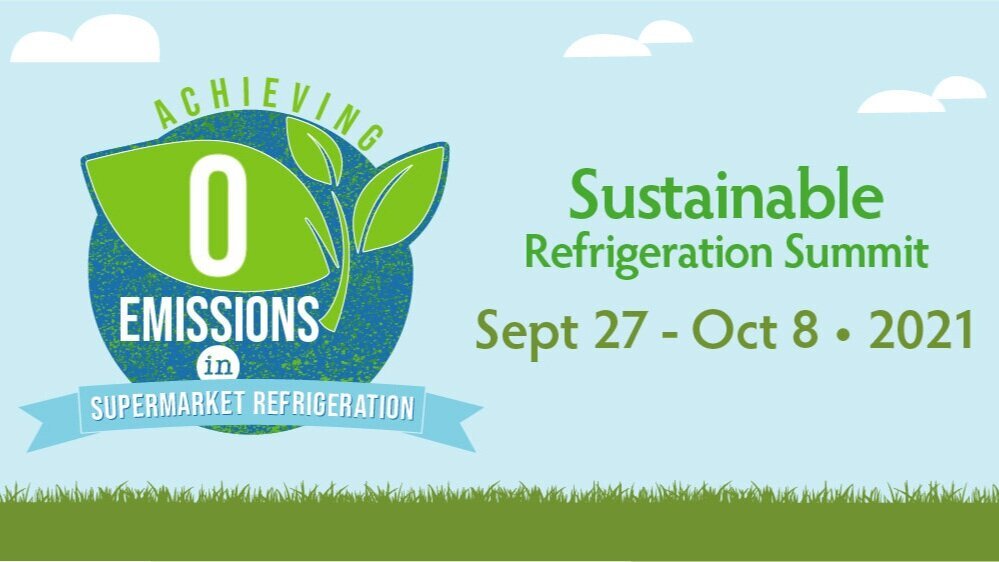When: 27 September 2021 - 08 October 2021
Sustainable Refrigeration Summit
The zero emissions movement is expanding rapidly at the local, state, and federal levels, expanding regulatory pressures on food retailers to address refrigerant emissions. This FREE virtual summit will bring together key stakeholders - including food retailers, manufacturers, service contractors, engineers, government agencies, policymakers, utilities, energy, and environmental stakeholders - to advance the solutions needed to achieve a zero emissions future for supermarket refrigeration.
Hear the latest regulatory and industry trends and learn from the food retailers, industry experts, and policymakers shaping the future of sustainable refrigeration.
Registration is now open for Sustainable Refrigeration Summit.
Summit Program
Hosted over a 2-week period, the summit will feature on-demand Technology Sessions and 1-2 daily live sessions. See the schedule below:
-Welcome: Industry & Regulatory Overview (Pre-recorded) Location: Pre-RecordedEverything you need to know about supermarket refrigeration, the latest on state and federal regulations and other forces driving towards zero emissions, and the cri...
Read More-Strategies for Zero Emissions Refrigeration
As more companies take a proactive role driving towards ambitious zero emissions targets, many questions remain. How is ‘zero emissions’ defined and measured? How are targets set? What are the pathways for food retail refrigeration? This session will...
Read More-The State of CO2 Transcritical
As CO2 transcritical systems gain popularity worldwide, US installations still face unique challenges. This session will review the latest innovations in CO2 transcritical system design and takeaways from real-world installations across different regions. Hear f...
Read More-Cascade and Secondary Solutions
Innovative alternatives to standard direct expansion systems have emerged using cascade or secondary system architecture that leverage CO2, Ammonia, and Propane. Food retailers, contractors, and other...
Read More-The Bright Future for R290
Micro-distributed systems (MDS) using propane (R290) have gained momentum as a viable solution for both new store builds and existing store remodels amidst the transition away from HFC refrigerants. This session will provide an ove...
Read More-Natural Refrigerants in Existing Stores
Existing stores represent both the greatest opportunity and greatest challenge to reduce HFC emissions. This session will highlight the technology solutions available today and under development to address common retailer decision ...
Read MoreNo sessions on this day
No sessions on this day
-Funding For Natural Refrigerants (Pre-Recorded)Location: Pre-Recorded
The high incremental cost of natural refrigerant equipment remains the biggest hurdle preventing widespread adoption and a swift transition away from HFCs. This session will summarize the current and...
Read More-Building Better Policies
Phasing out HFCs has been identified as a critical step towards achieving state and federal climate targets, resulting in increasing regulatory pressures on food retailers. In addition to new federal regulations under the American ...
Read More-The Energy Efficiency and GWP Nexus
As energy policies increasingly focus on decarbonizing the grid, utility targets are shifting towards broader carbon-based metrics that include the direct emissions from refrigerants. New interventions are needed to effectively eng...
Read More-Reducing Refrigerant Leaks
Refrigerant leaks not only represent the largest source of annual emissions in the average supermarket, but also represent a large financial and operational burden for food retailers. Reducing and ultimately eliminating leaks requi...
Read More-Workshop: Upcoming Refrigerant Regulations & Utility Incentives in Washington State
Washington is one of a growing number of states that has identified food retail refrigeration as a critical component of its overall emissions reduction strategy.&n...
Read More-Workshop: Future HFC Rulemakings in New York State
New York State has set aggressive climate targets that will result in significant HFC emissions reduction and implications for the food retail sector. New York’s current Part 496 regulation adop...
Read More-Workshop: State Solutions for Small & Independent Food Retailers
As more states seek to accelerate the transition away from hydrofluorocarbon (HFC) refrigerants as part of their overall climate strategies, it is apparent the negative impacts will fall disproportionately on small and independent ...
Read More